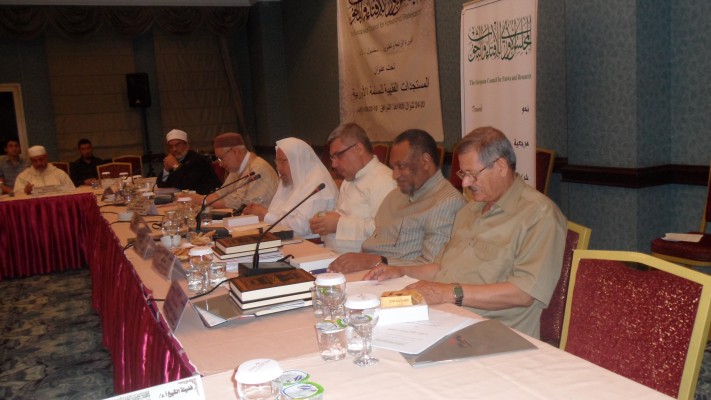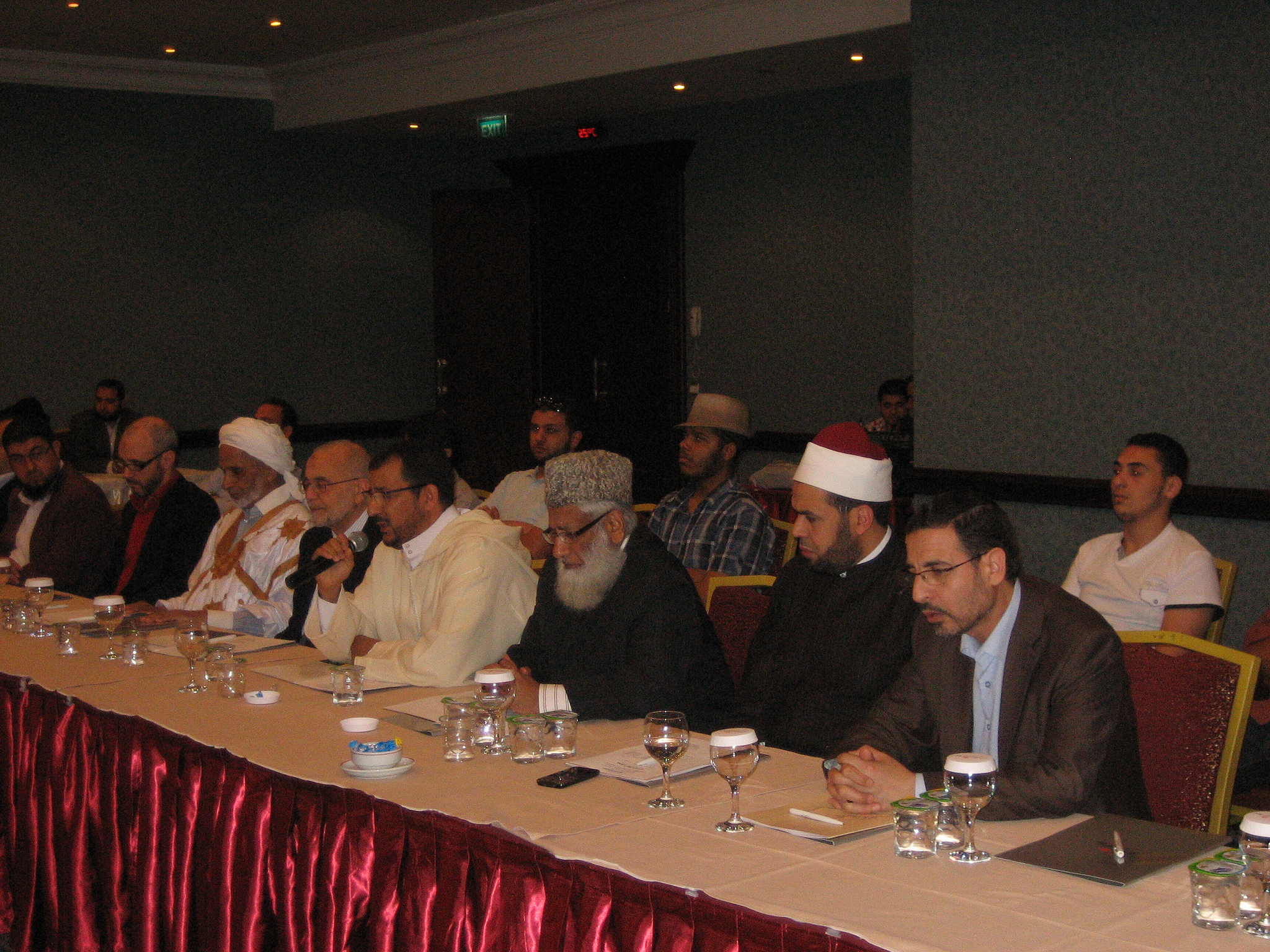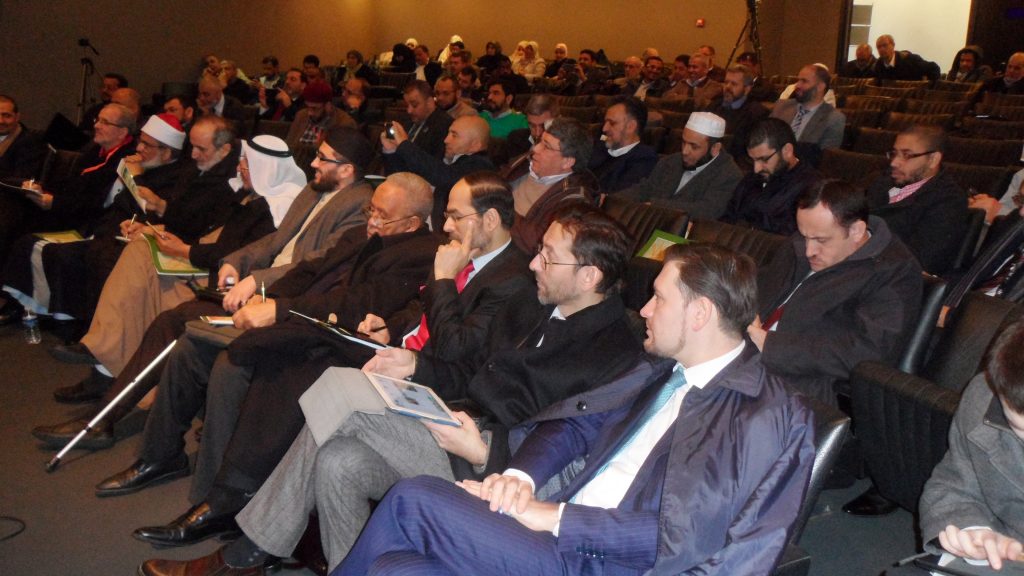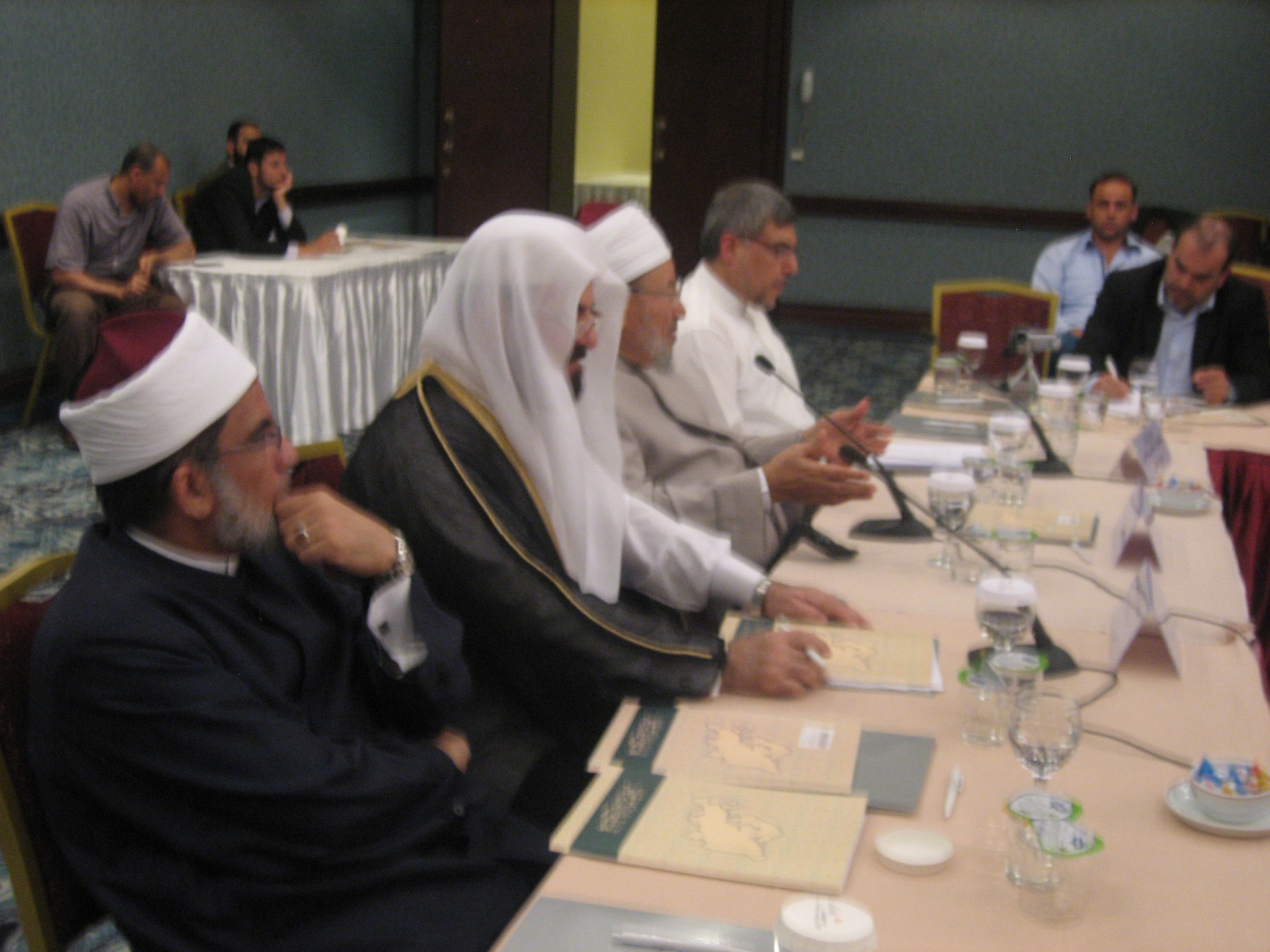The 22nd Ordinary Session of The European Council for Fatwa and Research
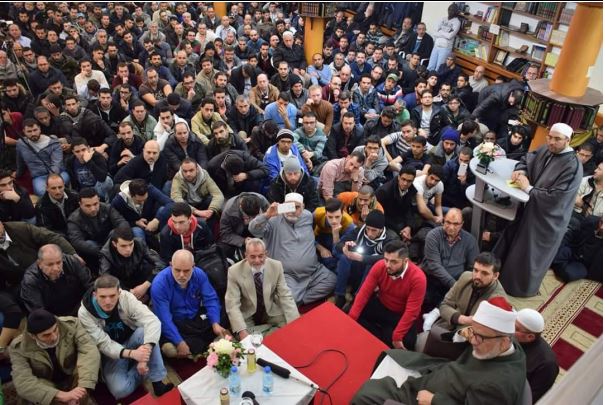
The European Council for Fatwa and Research
Final Statement
The 22nd Ordinary Session of
The European Council for Fatwa and Research
Held in Istanbul,
Turkey
During the period
6th – 10th of Sha’ban 1433 HJ
26th – 30th of July, 2012
In the Name of Allah, Most Gracious, Most Merciful
The final Statement of the Twenty Second Ordinary Session of the European Council for Fatwa and Research was held in Istanbul, Turkey during the period 06th – 10th Sha’ban, 1433 Hijra corresponding to 26th– 30th of July, 2012
Praise be to Allah, the Worlds’ Sustainer, and peace be upon our leader Muhammad and on all his family and his Companions and those who follow his guidance until the Day of Judgment.
By Allah’s Grace and His Assistance the Twenty Second Ordinary Session of the European Council for Fatwa and Research was held in Istanbul, Turkey during the period 06th – 10th Sha’ban, 1433 Hijra corresponding to 26th – 30th of July, 2012, chaired by His Eminence Sheikh Dr. Yusuf Al-Qaradawi, the Chairman, and attended by most of the Members of the ECFR and a number of guests and observers.
The Twenty Second Session was inaugurated by a speech introducing the ECFR and highlighting its significance, objectives and mission delivered by the deputy chair person Dr. Abdullah Al-Judai’. This was followed by a speech, stressing the important role played by the ECFR and the trust in which Muslim minorities have and the great interest showed by university and other students in Fatawa issued by the ECFR, delivered by the deputy chair person Prof. Ali Al-Quradaghy, who demanded essential development of the ECFR and its committees. Then a talk was given by His Eminence Sheikh Yusuf Al-Qaradawi in which he illustrated that the ECFR has been founded to meet the needs of Muslims residing in non-Islamic lands and that since their contexts require a Fiqh, based on removing hardship and conducted in light of considering Shari’ah objectives, the ECFR applies a moderate approach, which it calls “Renewing Moderation” supporting this naming by the hadith in which the Prophet Muhammad, peace be upon him, said: “Verily, every hundred years Allah commissions a scholar, who will renew for the Muslim nation their religion.” His Eminence added that this Fiqh, based on moderation, modernity and removing hardship, applied by true scholars and true Salafis, is well-connected to the great inherited Islamic Fiqh that has non-the-same throughout the history of all other nation. His Eminence Sheikh Yusuf Al-Qaradawi also stressed the paramount importance of the Shari’ah objectives comprising Fiqh rules founded on future expectations. In addition, His Eminence commented on the Arab spring and the victory Allah granted to the peoples of Tunisia, Egypt, Libya and Yemen and the expected future for Syria. He also gave the glad tidings of the expected removal of the oppressive regime ruling Syria as other oppressive regimes have been removed. He took an oath stating: “By Allah I firmly believe that the Syrian people will be victorious.” He reiterated this meaning and cried so his audience cried. His Eminence praised Allah as Dr. Muhammad Morsi has become the elected Egyptian president highlighting that the Muslim nation is in a critical phase where Islam is getting stronger. Consequently every Muslim should feel his/her responsibility and those who have knowledge and capabilities should fulfill their roles.
Then the ECFR resumed the agenda of its twenty second session assigning adequate time to review and develop the ECFR’s administrative issues. During this time reports submitted by the General Secretariat and subcommittees were recited and developing resolutions and procedures were taken. Afterwards the ECFR deliberated on the main topic of this session i.e. “Consequences of Actions and Their application in European Context”. A number of papers were submitted and extensively deliberated highlighting the significance of this topic in the sources of Fiqh and its objectives especially when considering its impact on Muslims’ contexts in the West. Due to the short history of founding this topic on Islamic sources and in light of the submitted papers one can vividly perceive the dire need of more researching and detailed studies especially when it comes to issues pertinent to its application in European context to which the ECFR will give close attention in successive sessions, please Allah.
In its twenty second session the ECFR also deliberated on the issue of the time of ‘Isha and Fajr (Night and Dawn) prayers in the summer of the European countries located at high latitudes since it impacts on the rules of prayers and fasting. This was followed by reviewing questions submitted to the general secretariat and issued Fatawa.
In its conclusion the ECFR reached the following resolutions, Fatawa and recommendations:
First: resolutions
Resolution 1/22
Impact of the Consequences of Actions on Forming Rules and Their Application
Upon deliberating on the submitted papers on this issue, the ECFR resolved as follows:
Since they lead to warding off evil and accomplishing objectives as stated by most of the Muslim scholars, considering the consequences of actions is of vital importance in deducing Islamic rules and their application. This matter is supported by a large number of Qur’anic verses and Ahadith. Allah said: “And do not insult those they invoke other than Allah, lest they insult Allah in enmity without knowledge.” (06:108) The Prophet Muhammad, peace be upon him, said: “O ‘Aisha! Had your people not been disbelievers recently, I would have knocked down the Ka’bah and rebuilt it making entrance and exit.” (Reported by Al-Bukhari and Muslim) Islamic rules are dependent on achieving their objectives. Consequently should an Islamic rule not achieve its objective, due to certain context, this context should be taken positively into consideration and this Islamic rule should be formed in light thereof.
Since they constitute an important factor when issuing Islamic rules, consequences should be considered thoroughly lest they should be delusional and subsequently rules based thereupon will be wrong. Hence, only definite and most likely consequences should be considered when issuing Islamic rules. As a precaution, when estimating consequences one may avail of contemporary sciences as many of them help to reach the right estimation of consequences. In addition, one may avail of these contemporary sciences to specify certain methodologies to gain knowledge about consequences such as induction, exploring the future, considering the norms etc. provided by anthropology, psychology, economic analysis, statistics, etc.
Consequences constitute a significant factor when issuing Islamic rules for all Muslims in general and in particular for Muslims residing in European countries since therein non-Islamic law is applicable creating a context where should certain Islamic rules be applied they may not lead to achieving their objectives and the consequences thereof may not be the same consequences incurred by the same rules if applied in Muslim countries, which urges Muslim scholars to show a higher level of flexibility on the requirements of methodologies applied when considering consequences and avail of auxiliary sciences, while taking into consideration the distinctiveness of Muslims residing in Europe.
Resolution 2/22
Isha and Fajr (Night and Dawn) Prayers in Countries Where Nights Are Short or Islamic Marks of Prayer Times Are Delayed or Disappear during the Month of Ramadan
Upon detailed deliberation and reviewing the studies and papers submitted on this matter and resolutions issued by Islamic research academies and resolution No. 3/3 reached by the ECFR, the ECFR resolved the following:
First Isha (Night) Prayer:
Currently some Imams of the mosques based in areas located at high latitudes where Islamic marks of prayer times are delayed or disappear establish Maghrib and Isha (Sunset and Night) prayers by means of advanced combination, whereas others apply the rule of relative time estimation. As for the first group, whether Islamic marks of prayer times disappear or are delayed in a way that that causes hardship, which is evaluated according to the norms dependent on people, places and circumstances, they may offer Maghrib and Isha (Sunset and Night) prayers by means of advanced combination when the time of Maghrib prayer commences or afterwards giving adequate time for people to break their fast. Alternatively they may offer Maghrib prayer when its time commences and shortly afterwards offer Isha prayer to relieve people. As for the latter group, should Islamic mark of Isha prayer time disappears, they should continue praying Isha and Taraweeh in the same estimated time they had before Ramadan but should it be delayed, they should offer Isha prayer in its time otherwise they may pray Maghrib and Isha (Sunset and Night) prayers by means of advanced combination.
The ECFR recommends Imams, by virtue of taking into consideration the context and the consequences, that they do not prolong prayers and religious lessons and that they should fulfill their due responsibilities towards their neighbours and the safety of the roads.
Second Fijr (Dawn) Prayer:
The ECFR does not nullify the various timing calculations applied by different mosques, since the differences among these timing calculations are accepted from a Fiqh point of view. In the meantime the ECFR recommends that religiously recognized permissions should be availed of to prolong the period of night as much as possible to give people chance to have good sleep and also to worship Allah.
Second Fatawa:
Fatwa 22/1
Women Following Funerals and Visiting Graves
Question: Is it permissible for women to pay a visit to the cemetery? If yes, what are the stipulations? Is it permissible for women to follow funerals? Is it permissible for a wife to follow the funeral of her deceased husband? Taking into consideration that burial may occur in a few days after his death, does the ‘Idda[1] commence by her husband’s death or burial?
Answer: Initially it is a duty incumbent on Muslims to follow the funerals of deceased Muslims, as stated in the hadith narrated by Abu Hurairah in which the Prophet Muhammad, peace be upon him, counts the rights Muslims owe to one another: “When he/she dies you shall follow his/her funeral.” (Reported by Muslim) This duty is for Muslims; males and females.
Muslim jurists expressed various views in this regard. According to the most preponderant views, it is permissible for women to follow funerals in general and in particular when the deceased person is a relative and non-Islamic behavior is avoided such as wailing and slapping their cheeks, rending their clothes and utter pre-Islamic expressions and non-observance the Islamic code of clothing. Um Atiya narrated: “We were forbidden from following funerals but this prohibition was not stressed.” (Reported by Al-Bukhari and Muslim.)
On the basis of the general statement narrated by Buraida Al-Aslami and made by the Prophet Muhammad, peace be upon him, in which he stated: “In the past I forbade you from visiting graves, from now on visit them.” (Reported by Muslim), the majority of Muslim jurists perceive women’s visit to cemeteries as permissible.
As for the ‘Idda, the death of her husband marks the beginning of her ‘Idda made of four months and ten days except for pregnant women as their ‘Idda ends by delivery. Allah said: “And those who are taken in death among you and leave wives behind – they, [the wives, shall] wait four months and ten [days].” (02:234) Also Allah said: “And for those who are pregnant, their term is until they give birth.” (65:04). ‘Idda does not prevent women from following funerals as long as there is a need or it is necessary.
Fatwa 22/1
On Line Conversations among Members of Opposite Sex
Question: Is it permissible to add one’s photo to an account on Facebook? Is conversation between members of opposite sex on Facebook permissible even though it could be done with the intention of marriage or other good aims such as organizing a charity function or the Arab revolutions?
Answer: Initially means of social communications are generally permissible since the means is permissible and objective is permissible. Nevertheless, when using them one must abide by Islamic ethics and morality such as being truthful, shunning spreading rumors and misinformation and harming others and deception and gossiping.
As for adding a photo to one’s account, it is not permissible if it shows areas that should be covered according to the Islamic code of clothing and if not one should be careful since once a photo is added to an account, one has no control over it.
As for the on line communications for marriage, the ECFR issued Fatwa No. 17/03 pertinent to this matter in which they are classified as permissible provided certain conditions are met. Nevertheless, one should be careful as they may have serious repercussions. Moreover, one cannot be sure of the participants’ intentions and moral standards.
There is no harm in conversations among members of opposite sex provided they discuss lawful matters such as charity functions, political issues etc provided they abide by Islamic ethics.
Third Recommendations:
With regard to the issues covered by the above- mentioned papers and issues pertinent thereto the ECFR issued a number recommendations as follows:
First: That Muftis, Imams of mosques and Islamic Centres and Muslim preachers based in Europe should take into consideration the Fiqh of Consequences especially when it comes to issues pertinent to the consequences of actions and sayings, when issuing Fatawa and statement.
Second: That Islamic faculties and institutes and students of Islam should pay close attention to the study of objectives and the Fiqh of Consequences in terms of their foundations, branches and application.
Third: That Muslims in Europe should be united particularly when it comes to commencement and the end of Ramadan and abiding by the resolutions issued by the ECFR, which unite them.
Fourth: That Imams, Muftis and those who are in charge at Islamic centers should remove hardship and apply a moderate approach and welcome various opinions given by Muslim jurists pertinent to the timing of prayer and abstaining from food and drink. In such cases applying the less correct views is more appropriate than applying the most correct view if it leads to removing hardship and unification especially in these years as Ramadan occurs in the summer where the day is long and the night is short and sometimes the marks of prayer times intermingle while in other times they disappear. Allah said: “Allah intends for you ease and does not intend for you hardship.” (02:185)
The ECFR confirms the usual recommendations issued to Muslims residing in Europe as follows:
- Observe all rights and reflect a good image and a benevolent example through words and deeds.
- Be creative and inventive and encourage that on all levels.
- Do their best to bring up the new Muslim generation – boys and girls- in a contemporary Muslim way via opening schools and educational and recreational centers to protect them against deviation.
- Work hard to establish firms and financial institutions that do not get involved in illegal transactions.
- Work hard to form legal (Shari’a) committees to regulate their family affairs according to shari’a and in conformity with the laws of the country where they live.
- Work hard to attain the recognition of the state where they live of Islam as a religion and of Muslims as a religious minority like other minorities in respect of enjoying their complete rights and organizing their personal affairs, such as marriage and divorce according to the tenets of their religion.
- Commit themselves to what is stated in the Holy Qur’an and Sunnah and what Muslim Fuqaha’ (jurists) have unanimously agreed upon regarding the obligation of keeping the requirements of the pledge of security and the terms of citizenship and residence in the countries where they live.
- Shun all types of violence and adopt a merciful and wise approach when dealing with all people by virtue of their Islamic obligations and condemn any other behaviour. The Council also recommends that Muslims in general and those dwelling in the West in particular adhere to Allah’s religion and brotherhood, tolerance, moderation, cooperation in matters of benevolence and righteousness, and adopt quiet dialogue and sound methods to solve controversial problems away from the programmes of strictness and paths of extremism that would distort the image of Islam and badly harm Muslims in general and Muslim minorities in particular. The enemies of Islam and those ignorant of it would defame it and warn others of it and its followers and instigate other nations against it. Allah Almighty says: “Invite (all) to the Way of your Lord with wisdom and beautiful preaching and argue with them in ways that are best and most gracious.” (An-Nahl 125)
The Council concluded the proceedings of the 22nd Session by addressing sincere thanks, prayers and appreciation to the al-Maktoum Charity Committee for their continuous support and sponsorship of the Council. The Council also extends sincere thanks to the Turkish Government for facilitating the holding of this session in Istanbul, their cooperation with the ECFR general secretariat and the granting of entry of visas to the members.
The ECFR would like to thank its general secretariat and all the brothers and sisters who contributed to the success of this session.
Our last prayer is praise be to Allah and may Allah’s peace, blessing and mercy be upon Prophet Muhammad, his family and his Companions.
[1] The period during which woman is not allowed to marry

